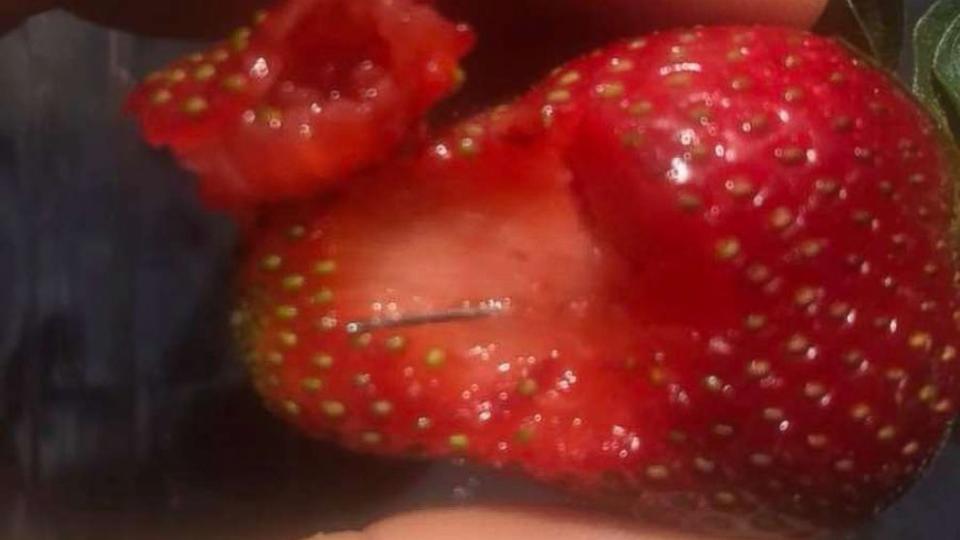Farmers' drastic new plan to find needles in sabotaged strawberries
Public fears about sewing needles concealed inside strawberries on supermarket shelves have spread across Australia and New Zealand as growers turn to metal detectors.
Sewing needles have now been found in strawberries in all six states, with New Zealand announcing this week it would pull the Australian-grown fruit from its supermarket shelves.
A Queensland strawberry farmer has spent thousands to install metal detectors to check his produce as the industry reels following the discovery of contaminated punnets of the fruit.
Glass House Mountains farmer Leonard Smith said that the safety measure would cost him about $30,000, but would hopefully get the rest of this season’s fruit back on supermarket shelves.

“I need to get them in service in weeks so I can pay some debt off so I don’t have to have some uncomfortable conversations,” Mr Smith told The Courier-Mail.
However, he said there was no guarantee they would work if the contamination was occurring offsite.
Mr Smith’s farm was forced to burn off 500,000 unsellable plants on the weekend as it was cheaper to kill them than pick them.
He said other growers were being forced to do the same.
Strawberry Growers Association of Western Australia president Neil Handasyde said growers had received requests from major retailers and insurance companies to scan fruit for needles.

Strawberries on supermarket shelves
Major Australian supermarket chains Coles and Aldi have pulled all strawberries from their shelves across Australia except in Western Australia state as a precaution.
But Western Australia police announced Monday that the first suspected needle contamination case has been reported in locally grown fruit.
Student takes university to court after failing an assignment
Family devastated after boy, 2, dies in his sleep without warning
From licence suspension to a $337 fine: The harsher penalties for drivers who break this law
A man in the town of York reported to police that he found a needle in a sink after washing strawberries.
The report came after a seven-year-old girl in South Australia found a needle in a Western Australia-grown strawberry on Saturday.
Western Australia Health Minister Roger Cook said the needle could have been inserted in the fruit after it arrived in South Australia.

“As an industry we are sure that [the needles] are not coming from the farm, but we’re trying to get confidence into consumers that when they buy … strawberries, that there isn’t going to be anything other than strawberries in there and they’re safe to eat,” Mr Handasyde told ABC.
“Industry are looking at lots of different ways of tackling this issue. There’s been metal detectors purchased and tamper-proof packaging looked at,” he said.
Handasyde said he paid AU$20,000 for a metal detector for his berry farm.
The Queensland government offered a $100,000 reward for information leading to the arrest of the person responsible for inserting needles into strawberries after six brands — Donnybrook Berries, Love Berry, Delightful Strawberries, Oasis, Berry Obsession and Berry Licious — were recalled.
New Zealand impact
Both of New Zealand’s major food distributors, Foodstuffs and Countdown, announced on Monday they are taking Australian strawberries off their shelves because of the scare.
New Zealand imports Australian strawberries when they are out of season locally from April to September, and both chains say the home-grown product will be on supermarket shelves soon.
Australian government launches investigation
Federal Health Minister Greg Hunt ordered the national food safety watchdog to investigate Queensland’s handling of the needle scare.
“The job is very, very clear. Protect the public and keep them safe,” Mr Hunt told the ABC.
Queensland Strawberry Growers Association vice president Adrian Schultz said what had started as a single act of “commercial terrorism” had brought a multimillion-dollar industry to its knees.
“I’m angry for all the associated people, it’s the farmers, the people who supply them, the packaging people, the truckies with families to support, who suddenly lose their jobs … it’s far-reaching,” Mr Schultz said.
– with AAP and AP


